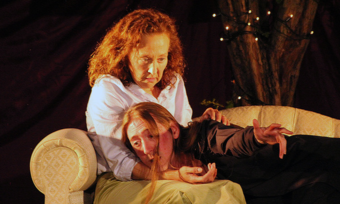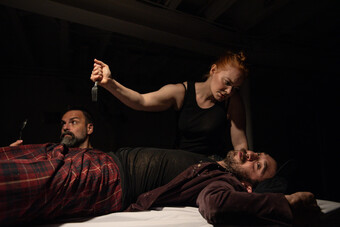Eroticizing Gender in Shakespeare’s R&J
An Interview with Joe Calarco
It has been fifteen years, two published versions, five translations, innumerable productions and tours both nationally and internationally, since the first production of Joe Calarco’s radical treatment of Shakespeare’s star-crossed lovers took residency at downtown New York City's Expanded Arts. Written for a cast of four male actors, Shakespeare's R&J performs the hegemony of Verona's patriarchal society and its robust masculinity by transporting it to an all boys’ Catholic military boarding school some time in the twentieth century. Although all male casting of the classic is rooted in the cross-gender performance of the Elizabethan stage, where a sixteenth-century audience finds themselves nurtured by such conventions, our contemporary audience can find context within changing social and political milieus. Containing the world of Romeo and Juliet within this stringent frame of codified ideals of masculinity, moral and ethical order, Calarco creates an adaptation which unmasks the normative nature of male-dominated Verona by aggressive visceral invention. The “boys” of Shakespeare’s R&J discover the forbidden text of Shakespeare’s play under a wooden floorboard, wrapped in a long, red cloth and enact, as well as are phenomenologically acted upon, an athletic deluge of adolescent agitation, terror, and fierce desire. Calarco revisits his production in a new version at Signature Theatre February 5 through March 3. What follows is an interview I conducted with him during this production process.
Moletress: You mentioned that you wanted to direct Romeo and Juliet before your engagement at Expanded Arts and that it came out of a desire to reexamine traditionalist productions. Was there a specific instance that prompted this?
Calarco: I don’t think there was one particular instance. I had just never seen a production of the play or any film version where the relationship didn’t come off as being incredibly sweet, and I’ve never thought of the relationship as sweet, so those interpretations never made sense to me. I’ve always seen the two of them as rather mad. But in most interpretations, the relationship never seemed sexy or dangerous, other than me being told that what they were doing was dangerous. The stakes never felt very high, and I remember always wanting the challenge of having to go into a rehearsal room with two actors and having to convince them that their wanting to be together was terrifying and dangerous because Mom and Dad would be mad because they were from feuding families. I always wondered how you’d make that palpable for two actors.
Moletress: You’ve framed the adaptation in a very specific world, which carries its own set of values, codes, and rules. How does this inform the world of Verona for you?
Calarco: Well, that world was created in order to mirror the danger and the restrictions in Verona. Again, how do you make feuding families seem dangerous? How do you make two actors understand what the word “forbidden” really means and what it feels like? Even before I got to the same sex angle of the production, I knew I needed more than that. That was the easy part. Making the school that the boys lived in terrifying is what took all the work, but once I came up with the idea that to simply read Romeo and Juliet was forbidden, I knew we had found the kernel of something. Uttering the words themselves is fraught with danger, and to me this school is run by Nazi-like figures. Punishment is swift if rules are broken. Death is possible. Even before they get to acting out and then falling into the situations of the play, the boys are on terribly dangerous ground.
How do you make feuding families seem dangerous? How do you make two actors understand what the word “forbidden” really means and what it feels like?
Moletress: Did you find the inherent homoeroticism of a contemporary production with four boys dealing with sexual repression something that you embraced or pushed against?
Calarco: Well, it was inherent in the concept. If it’s a world full of boys and they have to act out love scenes, they have to deal with that somehow. It’s terrifying for all of the boys. The boys acting it out are terrified by the feelings drummed up in them. I’ve always said, “When I was sixteen if I bumped against a desk, I got a hard-on, so if someone touched my leg, no matter their gender, forget it. Kaboom!” It really didn't matter the gender of the person. When you're discovering sex, it’s confusing anyway. In a single-sex environment there is the opportunity for even more confusion and violence, too, depending on who might happen to be watching. It’s just as terrifying for the boys who witness the love scenes—“What are our buddies doing?” They all grow incredibly during the evening though. They learn to accept that love is love no matter who’s experiencing it.
Moletress: “No subtext in Shakespeare” is an often-uttered statement. What are your thoughts on Shakespeare’s characters saying what they mean and meaning what they say?
Calarco:Well, I do think for the most part that you can and have to act on the text. The characters say what they’re thinking and feeling. There is no need for pause. They speak out their thought process. They lie certainly, but we know when they’re lying. I do think there are some extraordinary moments in Romeo and Juliet that seem very “modern” in their psychological complexity. I think most especially when the Nurse lies to Juliet once her father says she must marry Paris. The Nurse tries to make it seem like a good thing. We know she’s lying. Juliet’s horror at this betrayal is so palpable, but the Nurse knows that they both have to live this lie if they are to survive. They have no choice, and she knows it and she says it.
Moletress: Do you find this to be true with a contemporary adaptation, especially regarding yours within its contextual frame?
Calarco: In this adaptation we are also telling the story of these boys’ discovery of the play. Some extraordinary things happen, and they respond to those events, and there are moments when they feel like the play itself has betrayed them—when they can’t believe the way the story is going. There is air within the story of the boys in those moments.
Moletress: This project followed on the heels of former President Clinton signing the Defense of Marriage Act in 1996 and then during its run, the death of Matthew Shepard and the inception of The Trevor Project in 1998. At a time that brought national awareness to youth advocacy in the GLBT community, did these events shape your approaching the Chicago, West End, and subsequent productions?
Calarco: Honestly, none of them did at the time. It’s not where I was with the piece at the time. It’s only been on this current production that I’ve really faced and come to terms with the fact that there are ramifications in terms of what the last image of the show is. The original goal of the end was to find the emotional equivalent of the loss felt at the end of Romeo and Juliet. That moment is still there but I’ve taken the story to the next step—I’d like to think that it now leaves us in a place of hope.
Moletress: You recently made a major change to the ending of the play. Did the decision come out of a recent discovery?
Calarco: With football players proudly pronouncing their homophobia and students still hanging themselves in playgrounds, and with some people around me struggling with sexual identity issues, I felt I had to take a look at the final image of the show and accept a certain amount of responsibility for what that image was saying.
Moletress: What is the biggest discovery you made about the play, your work or audiences’ responses over the past fifteen years?
Calarco: I’m just consistently reminded of how great a story Romeo and Juliet is and how an audience just wants to be swept up into it. I’m also consistently reminded how an audience’s own personal history informs what they take away from the play. And in regards to discoveries about my own work—R&J is the synthesis of everything I am most attracted to in the theater—theater can happen anywhere with very little resources on hand. These boys discover and tell this story with no props, no costumes, and yet we get a very vivid retelling of Romeo and Juliet, and we witness a real self- discovery in the boys themselves.












Comments
The article is just the start of the conversation—we want to know what you think about this subject, too! HowlRound is a space for knowledge-sharing, and we welcome spirited, thoughtful, and on-topic dialogue. Find our full comments policy here